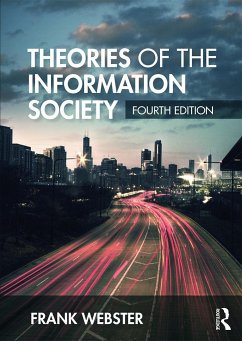
The Information Society Reader
Versandkostenfrei!
Versandfertig in 1-2 Wochen
64,99 €
inkl. MwSt.
Weitere Ausgaben:

PAYBACK Punkte
32 °P sammeln!
There has been much debate over the idea of 'the information society'. Some thinkers have argued that information is becoming the key ordering principle in society, whereas others suggest that the rise of information has been overstated. Whatever the case, it cannot be denied that 'informization' has produced vast changes in advanced societies. The Information Society Reader pulls together the main contributions to this debate from some of the key figures in the field. Major topics addressed include: * post-industrialism * surveillance * transformations * the network society * democracy * digital divisions * virtual relations. With a comprehensive introduction from Frank Webster, selections from Manuel Castells, Anthony Giddens, Michel Foucault and Christopher Lasch amongst others, and section introductions contextualising the readings, this book will be an invaluable resource for students and academics studying contemporary society and all things cyber.














